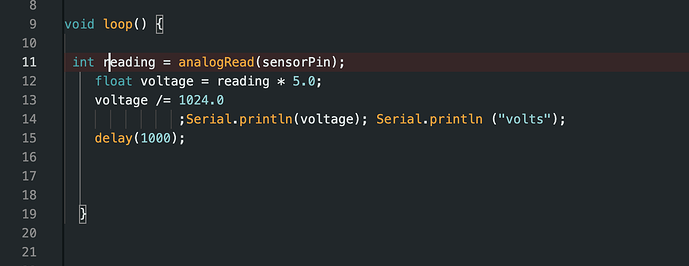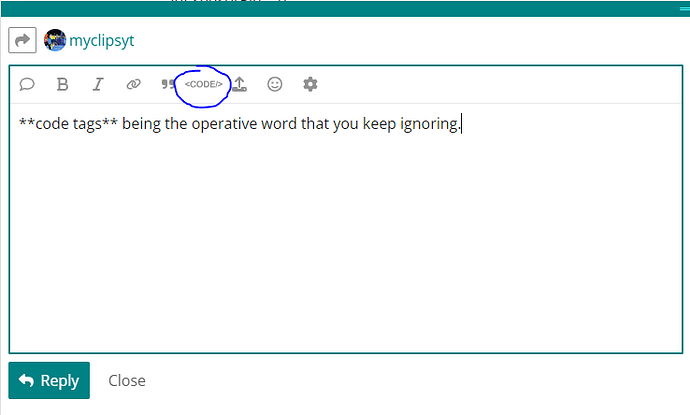You can always edit a post here:
Rightly so. That's why I usually upload and run code I post… if I had, well the second setup() wou,d certainly have been renamed.
I think you'll have to get accustomed to seeing that, it happens all the time.
I could say I don't like introducing variables where not doing suffices. But sometimes it is useful if only to clarify the code. No so much in this case.
And @mikedb writes it like a normal programmer,
float voltage = (reading * 5.0)/1024.0;
Serial.print(voltage);
which we all see immindiantly, here however I would write
float voltage = reading / 1024.0 * 5.0;
Serial.print(voltage);
which is why the original is inoffensive to me which means if I were being verbose I would have written
int reading = analogRead(sensorPin);
float voltage = reading / 1024.0;
voltage *= 5.0;
Of course if you are watching your weight
float voltage = analogRead(sensorPin) / 1024.0 * 5.0;
I never come so close to maxing out any of the resources of a board I have chosen for a project that I don't usually worry about a few extra steps or variables or their sizes, not on the basis of saving time or space.
a7
Of course ![]()
![]()
More than being correct, I was trying to make a point in too much of a hurry.
The less variables the better, always.
Smart.
Because you know what you're doing ![]() You learned (possibly the hard way) that when the IDE reports 1300 bytes RAM usage for a code with an Adafruit SSD1306 library on an Uno, you will need to add 1kByte to that usage; similar for the Adafruit NeoPixel library; add N * 3 bytes.
You learned (possibly the hard way) that when the IDE reports 1300 bytes RAM usage for a code with an Adafruit SSD1306 library on an Uno, you will need to add 1kByte to that usage; similar for the Adafruit NeoPixel library; add N * 3 bytes.
How do I compile the Code?
Can you please copy and paste your code in code tags
Yes.. .
/Users/radley/Documents/Arduino/sketch_oct07a/sketch_oct07a.ino: In function 'void loop()':
/Users/radley/Documents/Arduino/sketch_oct07a/sketch_oct07a.ino:11:27: error: 'sensorPin' was not declared in this scope
int reading = analogRead(sensorPin);
^~~~~~~~~
/Users/radley/Documents/Arduino/sketch_oct07a/sketch_oct07a.ino:11:27: note: suggested alternative: 'constrain'
int reading = analogRead(sensorPin);
^~~~~~~~~
constrain
exit status 1
Compilation error: 'sensorPin' was not declared in this scope
That isn't your code.
Please note I said in code tags. That goes for error outputs too.
oh ok sorry
void setup() {
// put your setup code here, to run once:
int sensorPin = 0;
void setup ();
Serial.begin(9600);
}
void loop() {
int reading = analogRead(sensorPin);
float voltage = reading * 5.0;
voltage /= 1024.0
;Serial.println(voltage); Serial.println ("volts");
delay(1000);
}
I'm so sorry
void setup() {
// put your setup code here, to run once:
int sensorPin = 0;
void setup ();
Serial.begin(9600);
}
void loop() {
int reading = analogRead(sensorPin);
float voltage = reading * 5.0;
voltage /= 1024.0
;Serial.println(voltage); Serial.println ("volts");
delay(1000);
}
// Define the pin for the analog sensor
const int sensorPin = A0; // Use A0 for analog pin 0
void setup() {
// Initialize serial communication at 9600 baud
Serial.begin(9600);
}
void loop() {
// Read the analog value from the sensor
int reading = analogRead(sensorPin);
// Convert the reading to voltage
float voltage = reading * (5.0 / 1023.0); // Use 1023 for a 10-bit ADC
// Print the voltage to the serial monitor
Serial.print(voltage);
Serial.println(" volts");
// Delay for 1 second
delay(1000);
}
Try that. The sensor pin is now a global variable.
Also 0 is for a Digital pin. A0 is for the Analogue input pin.
The setup() function should not have any declarations inside it.
The maximum value from analogRead() is 1023 (not 1024). The division should use 1023.0 to get the correct voltage range.
I changed the Serial.println() to use Serial.print() for the voltage followed by Serial.println() for the string "volts" to make the output clearer.
This is very bad practice, makes it hard to read. Press CTRL+T in the IDE to fix the indentation, too.
IT WORKED yes thank you so much
If you have a solution, please don't forget to mark it as such.
My LED will not stop flashing
How do I fix that?
What LED? There is no LED in your code.
Do you mean the built in LED on pin 13, or the TX/RX LEDs?
Build in LED
On pin 13
Is it an official arduino, or a clone?
Some clones do that, I haven't found a cause yet.
// Define the pin for the analog sensor
const int sensorPin = A0; // Use A0 for analog pin 0
const int ledPin = 13; // Define pin 13 for LED (if you want to control it)
void setup() {
// Initialize serial communication at 9600 baud
Serial.begin(9600);
// Set pin 13 as an output
pinMode(ledPin, OUTPUT);
// Initialize the LED to LOW (turn it off)
digitalWrite(ledPin, LOW);
}
void loop() {
// Read the analog value from the sensor
int reading = analogRead(sensorPin);
// Convert the reading to voltage
float voltage = reading * (5.0 / 1023.0); // Use 1023 for a 10-bit ADC
// Print the voltage to the serial monitor
Serial.print(voltage);
Serial.println(" volts");
// Delay for 1 second
delay(1000);
}


